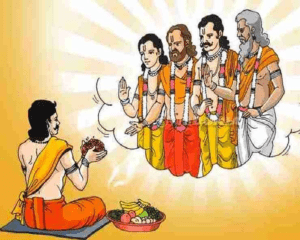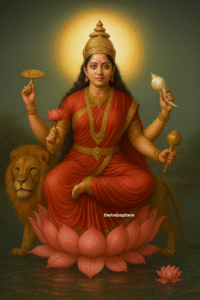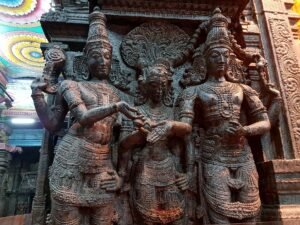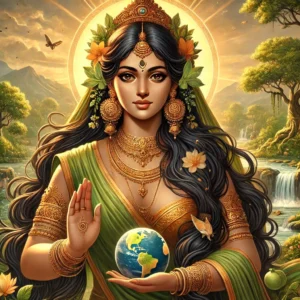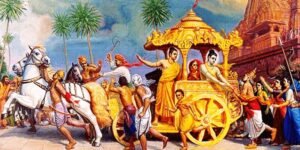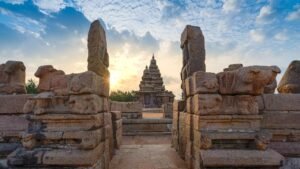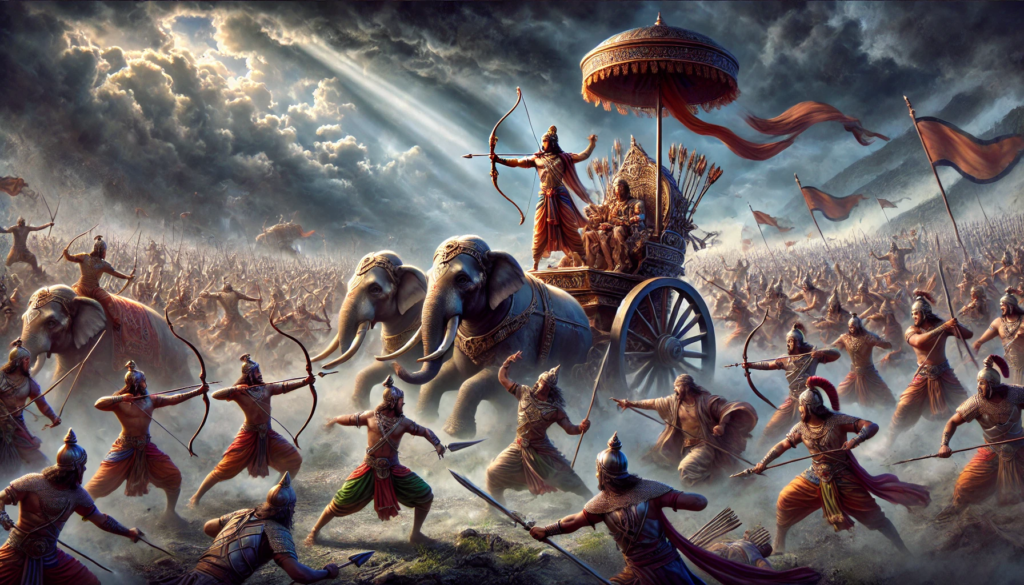
Introduction to the Mahabharata
The Mahabharata is one of the greatest epics of ancient India, attributed to the sage Vyasa. Comprising over 100,000 shlokas, it is one of the longest epic poems in the world. It narrates the complex story of the Kuru dynasty, focusing on the rivalry between the Pandavas and the Kauravas, culminating in the great war of Kurukshetra. More than just a tale of war, the Mahabharata explores themes of dharma (righteousness), duty, loyalty, and fate. It also includes the Bhagavad Gita, one of the most revered spiritual texts in Hindu philosophy.
The Birth of the Kuru Dynasty
The origins of the Mahabharata begin with King Shantanu of the Kuru dynasty, who falls in love with the celestial river Ganga. Their son, Bhishma, takes an oath of celibacy to ensure his father’s happiness. Later, Shantanu marries Satyavati, and their descendants include Dhritarashtra, Pandu, and Vidura. Dhritarashtra, being blind, is deemed unfit to rule, leading to Pandu becoming king. However, due to a curse, Pandu is unable to father children, and his wives Kunti and Madri conceive the Pandavas through divine intervention. Dhritarashtra’s wife, Gandhari, gives birth to the Kauravas, including the eldest, Duryodhana, who becomes the chief antagonist.
Pandavas and Kauravas: The Rivalry Begins
The Pandavas—Yudhishthira, Bhima, Arjuna, Nakula, and Sahadeva—and the Kauravas are trained by Guru Dronacharya in the art of warfare. Arjuna emerges as the most skilled archer, leading to jealousy from Karna, who later becomes a close ally of Duryodhana. The rivalry intensifies when Draupadi, daughter of King Drupada, is won by Arjuna in a contest of skill. Duryodhana, feeling humiliated, seeks revenge, setting the stage for future conflict.
The Game of Dice and the Exile of the Pandavas
Duryodhana, advised by his cunning uncle Shakuni, invites Yudhishthira to a game of dice, where he loses his kingdom, his brothers, and even Draupadi. In one of the most tragic moments of the epic, Draupadi is publicly humiliated but is saved by Lord Krishna. As a result, the Pandavas are exiled for 13 years, with the final year spent in disguise. During their exile, they encounter many challenges, including Bhima’s battle with Hidimba, Arjuna’s penance to obtain divine weapons, and Draupadi’s encounter with Kichaka.
Arjuna’s Pilgrimage and Divine Weapons
During exile, Arjuna embarks on a spiritual journey to acquire powerful divine weapons from Lord Shiva, Indra, and other celestial beings. His meeting with Krishna further strengthens his resolve. Krishna plays a crucial role in guiding Arjuna, preparing him for the great war that awaits.
The Kurukshetra War: Prelude to Destruction
After completing their exile, the Pandavas demand their rightful kingdom, but Duryodhana refuses. Krishna, acting as a peacemaker, offers a diplomatic solution, but war becomes inevitable. As battle preparations begin, Krishna offers his army to one side and himself as a non-combatant charioteer to the other. Arjuna chooses Krishna, while Duryodhana takes his army.
On the battlefield, Arjuna is conflicted about fighting his own relatives. It is here that Krishna delivers the Bhagavad Gita, explaining the essence of duty (dharma) and devotion.
Key Battles and Turning Points in the War
The Kurukshetra War lasts for 18 days, filled with epic duels and tragic losses. Some of the most significant events include:
- Bhishma’s fall, caused by Arjuna and Shikhandi.
- Abhimanyu’s valiant fight and death, a heartbreaking moment in the war.
- Jayadratha’s killing, avenging Abhimanyu.
- Karna’s final battle, where he is defeated by Arjuna after Krishna reveals his vulnerabilities.
- Drona’s rampage and death, tricked into believing his son has died.
The Fall of Duryodhana and the Aftermath
After the deaths of all his brothers and warriors, Duryodhana is mortally wounded by Bhima in a mace fight. His close ally, Ashwatthama, seeking revenge, uses a forbidden weapon to kill the remaining Pandava lineage, except for their unborn grandson, Parikshit.
The war leaves deep scars, and Krishna’s departure from the mortal world marks the beginning of Kali Yuga—the age of decline.
The Ashwamedha Yajna and Yudhishthira’s Rule
With the Kauravas defeated, Yudhishthira ascends the throne and performs the Ashwamedha Yajna to establish peace. However, the Pandavas, weary of ruling, eventually renounce their kingdom and set off on a final journey to the Himalayas. One by one, they perish, leaving only Yudhishthira, who ascends to heaven with the help of Indra.
The Legacy of the Mahabharata: Lessons and Philosophical Insights
The Mahabharata is more than just a tale of war—it is a philosophical and moral guide. Some of its enduring lessons include:
- Dharma vs. Adharma: The struggle between right and wrong is a central theme.
- The Bhagavad Gita’s wisdom: Krishna’s teachings on duty, righteousness, and devotion continue to inspire millions.
- The impact on culture and literature: The epic has influenced countless works of art, literature, and philosophy across the world.
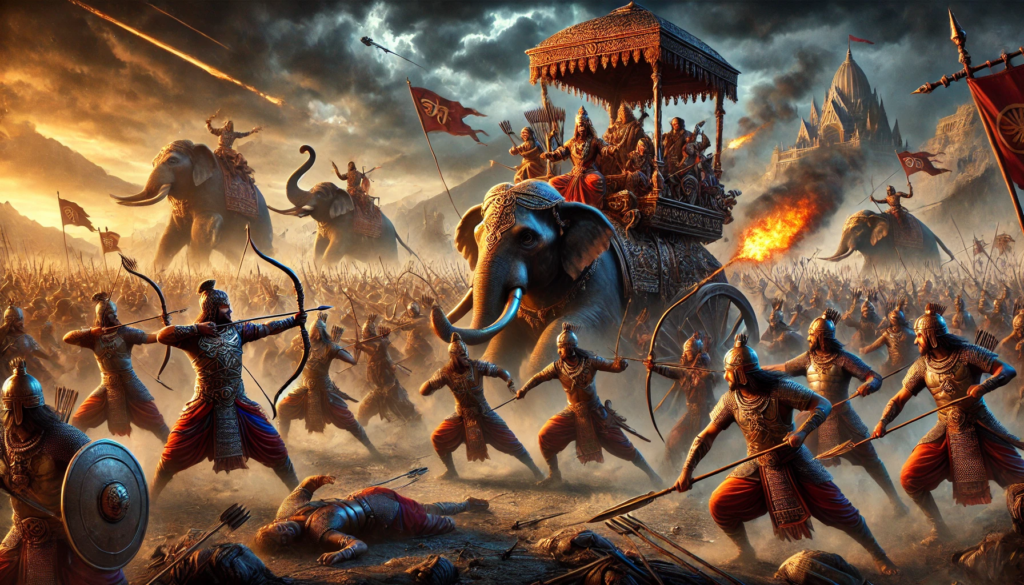
Key Characters in the Mahabharata
Below is a table listing the major characters in the Mahabharata and their significance:
| Character | Role & Significance |
|---|---|
| Vyasa | Sage and author of the Mahabharata; father of Dhritarashtra, Pandu, and Vidura. |
| Bhishma | Granduncle of both Pandavas and Kauravas; took a vow of celibacy and was a great warrior. |
| Dhritarashtra | Blind king of Hastinapura; father of the Kauravas. |
| Gandhari | Wife of Dhritarashtra; mother of the Kauravas, who blindfolded herself for life. |
| Pandu | Younger brother of Dhritarashtra; father of the Pandavas. |
| Kunti | Mother of the Pandavas; invoked divine beings to give birth to her sons. |
| Madri | Second wife of Pandu; mother of Nakula and Sahadeva. |
| Yudhishthira | Eldest Pandava; known for his righteousness and adherence to dharma. |
| Bhima | Second Pandava; known for his immense strength. |
| Arjuna | Third Pandava; greatest archer and recipient of the Bhagavad Gita. |
| Nakula | Fourth Pandava; skilled in swordsmanship. |
| Sahadeva | Youngest Pandava; known for his wisdom. |
| Draupadi | Wife of the Pandavas; central to the conflict between Pandavas and Kauravas. |
| Duryodhana | Eldest Kaurava; primary antagonist of the Mahabharata. |
| Karna | Friend of Duryodhana; skilled warrior with a tragic fate. |
| Shakuni | Uncle of the Kauravas; mastermind behind the game of dice. |
| Dronacharya | Teacher of both Pandavas and Kauravas; a master of warfare. |
| Kripacharya | A great teacher and advisor in Hastinapura. |
| Ashwatthama | Son of Dronacharya; played a key role in the war’s aftermath. |
| Jayadratha | Kaurava ally; involved in Abhimanyu’s tragic death. |
| Abhimanyu | Son of Arjuna; displayed great valor in the war. |
| Ghatotkacha | Son of Bhima; played a crucial role in the war with his mystical powers. |
| Krishna | Incarnation of Vishnu; Arjuna’s charioteer and spiritual guide. |
| Vidura | Wise minister of Hastinapura; known for his righteousness. |
| Shikhandi | Played a pivotal role in Bhishma’s downfall. |
| Ekalavya | A great archer who was denied formal training by Dronacharya. |
| Uttara | Wife of Abhimanyu and mother of Parikshit. |
| Parikshit | Grandson of the Pandavas; continued their lineage. |
The Mahabharata remains a timeless epic, rich with lessons on human nature, destiny, and the eternal quest for truth. It continues to be a source of spiritual and philosophical guidance, proving that its wisdom is as relevant today as it was thousands of years ago.

